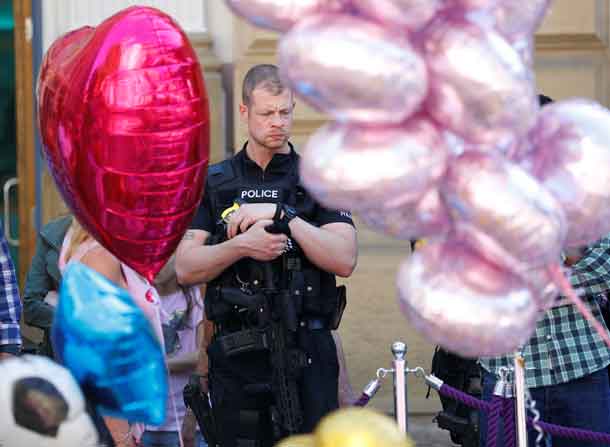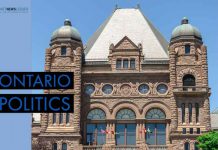

By Michael Holden
LONDON (Reuters) – Campaigning for Britain’s national election next month resumed in earnest on Friday, with the country still on high alert for further attacks, days after a suicide bombing killed 22 people in Manchester.
A new poll indicated that Labour had closed to five points behind Prime Minister Theresa May’s Conservative party, with police budgets and foreign policy emerging as key campaign issues.
Armed police are patrolling cities and trains, and hospitals have been warned to be ready, but Security Minister Ben Wallace said there was no evidence of a specific threat over the holiday weekend, when a number of major events take place.
In Manchester, police investigating a suspected network behind Salman Abedi, the 22-year-old British-born man with Libyan parents who blew himself up after a concert by U.S. singer Ariana Grande, made a further arrest and raided other properties.
“The police are confident that they are in a position to have good coverage of what’s happened and of rolling it (the network) up,” Wallace told BBC radio.
For the first time since the attack, politicians resumed campaigning on a national scale for the June 8 vote as an opinion poll put Prime Minister Theresa May’s lead, once as much as 23 percentage points, at just five points.
May called the snap election to strengthen her hand in negotiations on Britain’s exit from the European Union, but her campaign hit trouble when she pledged to make elderly people pay more for their social care, and she was forced on Monday to backtrack on a policy dubbed the “dementia tax” by opponents.
SUPPORT FALLING
May’s Conservatives saw their support fall to 43 percent while backing for Labour rose to 38 percent in the YouGov poll, causing sterling to lose more than half a percent against both the dollar and euro.
In a speech in London, Labour leader Jeremy Corbyn was set to criticise May for cutting police numbers and say Britain’s involvement in foreign wars had increased the threat of terrorism.
“Many experts, including professionals in our intelligence and security services, have pointed to the connections between wars our government has supported or fought in other countries and terrorism here at home,” he was due to say, according to extracts released in advance to the media.
“We must be brave enough to admit the ‘war on terror’ is simply not working.”
Labour has also pledged 10,000 extra police officers to reverse a decline in numbers resulting from cost-saving measures, many brought in by May in her former role as interior minister.
“We cannot be protected and cared for on the cheap,” Corbyn will say.
Opponents accused Corbyn of politicising the Manchester attack. Wallace said the comments were “incredibly disappointing and crass”.
POLICE CUTS
However, with almost 20,000 fewer police than when the Conservatives came to power in 2010, concern about police cuts is likely to become a major issue in campaigning.
“We’re now 20,000 police officers down, and we get atrocities like this. Does the government not expect this?” one voter, who was not named, asked interior minister Amber Rudd on the BBC’s Question Time programme on Thursday night.
Rudd said counter-terrorism was adequately resourced, and denied that the cuts had hindered the authorities’ ability to prevent Monday’s attack.
“We must not imply that this terrorist activity wouldn’t have taken place if there had been more policing,” she said.
May herself was attending her first G7 meeting since becoming prime minister last year and planned to urge the world’s major industrialised nations to unite to force technology companies to tackle websites or social media that are used to promote or facilitate radical ideologies.
“The PM will say that the threat we face is evolving, rather than disappearing, as Daesh (Islamic State) loses ground in Iraq and Syria. The fight is moving from the battlefield to the internet,” a government source said.
Since the Manchester bombing, Britain has been on its highest alert level, “critical”, meaning an attack might be imminent.
Troops have been deployed to free up police, and armed officers are patrolling trains for the first time while the state-run National Health Service said all 27 major trauma units in England had told staff to be prepared for a possible attack.
There are a number of high-profile events this weekend and on Monday, which is a public holiday, including the soccer FA Cup final in London on Saturday.
Chief Superintendent Jon Williams, who heads the capital’s public order policing, said there would be extra armed officers on duty.
(Additional reporting by Alistair Smout, Paul Sandle, and Elizabeth Piper)






